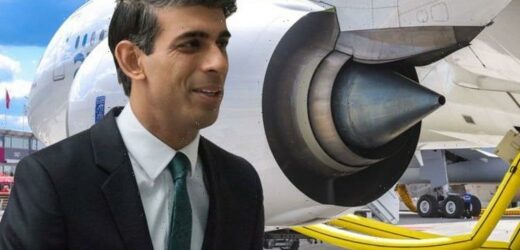Rolls-Royce Chief discusses target for Sustainable Aviation Fuel
We use your sign-up to provide content in ways you’ve consented to and to improve our understanding of you. This may include adverts from us and 3rd parties based on our understanding. You can unsubscribe at any time. More info
While it is true that aviation is a carbon-heavy industry that sets the world back on its climate targets, plans to decarbonise the industry could mean that down the line, the UK economy could boom while maintaining Boris Johnson’s net-zero pledges thanks to green innovations from companies like Rolls Royce. And although the British company has recognised that most of their existing products do currently emit carbon, they are planning to manufacture a revolutionary change to make their products net-zero compatible.
It comes as Chancellor Rishi Sunak had earlier come under fire for halving the tax on domestic flights, which he announced at the autumn budget.
Rolls Royce CTO Paul Stein told Express.co.uk: “We are making sure all our existing products that we make that we know are going part of our future are net-zero compatible.
“Aviation is always as seen a hard to decarbonise sector, and as a company we believe it is hard to carbonise, but all sectors are hard to decarbonise and there isn’t a magic bullet behind anything and we’re trying to help all sectors as much as we can.”
Mr Stein explained that there are three pillars involved in helping to decarbonise the aviation sector.


He told Express.co.uk: “The first pillar is making our engines more and more efficient, because whatever happens the fewer emissions that come out of the better.
“At Rolls Royce, one of our big contributions to that is our technology called ultrafan, the next generation of big engines that are designed to have 10 percent fuel efficiency over our previous engines, and very importantly, are designed to be 100 percent compatible with sustainable aviation fuels out of the box.”
This means that ultrafans will function as a net-zero propulsion system for an aircraft, Mr Stein said.
The second pillar of decarbonising the aviation industry involves ramping up the production of sustainable aviation fuels.
Sustainable aviation fuels are fuels that will eventually be net-zero.
This means that when a sustainable aviation fuel is burnt in an engine, it takes an atom of carbon from the atmosphere at puts it back into the atmosphere again.

Mr Stein then explained that his company are planning ways to make sustainable aviation fuels through methods such as e-fuels, which are ways of synthesising fuel with zero-carbon energy from renewables.
And the third pillar, an exciting development, involves electric flight as Rolls Royce looks to create new ways of propelling aircraft.
He said: “We’re really excited by pure electric flight.
“Some of our developments with electric flight are so exciting that it’s likely that they will displace some other means of connecting population centres together.
“You can see how this technology can create a whole new means of people moving around the place and it’s not just for rich people as they are designed to be quite low cost.”
But this also comes as Rishi Sunak, Chancellor of the Exchequer, halved domestic flight taxes in his autumn budget in the run-up to the Cop26 climate summit in Glasgow.
DON’T MISS
Researchers unravel mystery of why voices of dead can be ‘heard’ [REVEAL]
Archaeologists stunned by ‘unusual material’ found in Babylon [INSIGHT]
Sturgeon shamed: ‘Mound of waste’ washes up outside COP26 event [REPORT]


As world leaders meet this week to discuss and collaborate on climate targets in the crucial summit, Mr Sunak was hammered by critics for going “headlong in the wrong direction” by encouraging increased flights, which boost up emissions.
But Rolls Royce may have handed Mr Sunak a get out of jail free card as the blueprint for a decarbonised aviation industry looks set to be on the cards, which could keep emissions low while revitalising the profitable industry.
The chancellor had halved the tax on domestic flights, while air passenger duty was increased by £4 on “ultra-long” flights of more than 5,550 miles, from £87 to £91.
The changes were a tax giveaway of £30million a year.
After coming under heavy fire from environmental groups, Mr Sunak defended his decision following claims that his move could lead to 400,000 more domestic flights every year.
He told BBC Radio 4’s Today Programme: ” What we’re doing on air-passenger duty is going back to a system we used to have, which means we don’t essentially double-tax people for flying inside the UK – so in that sense it’s a pro-union policy.”
Source: Read Full Article


